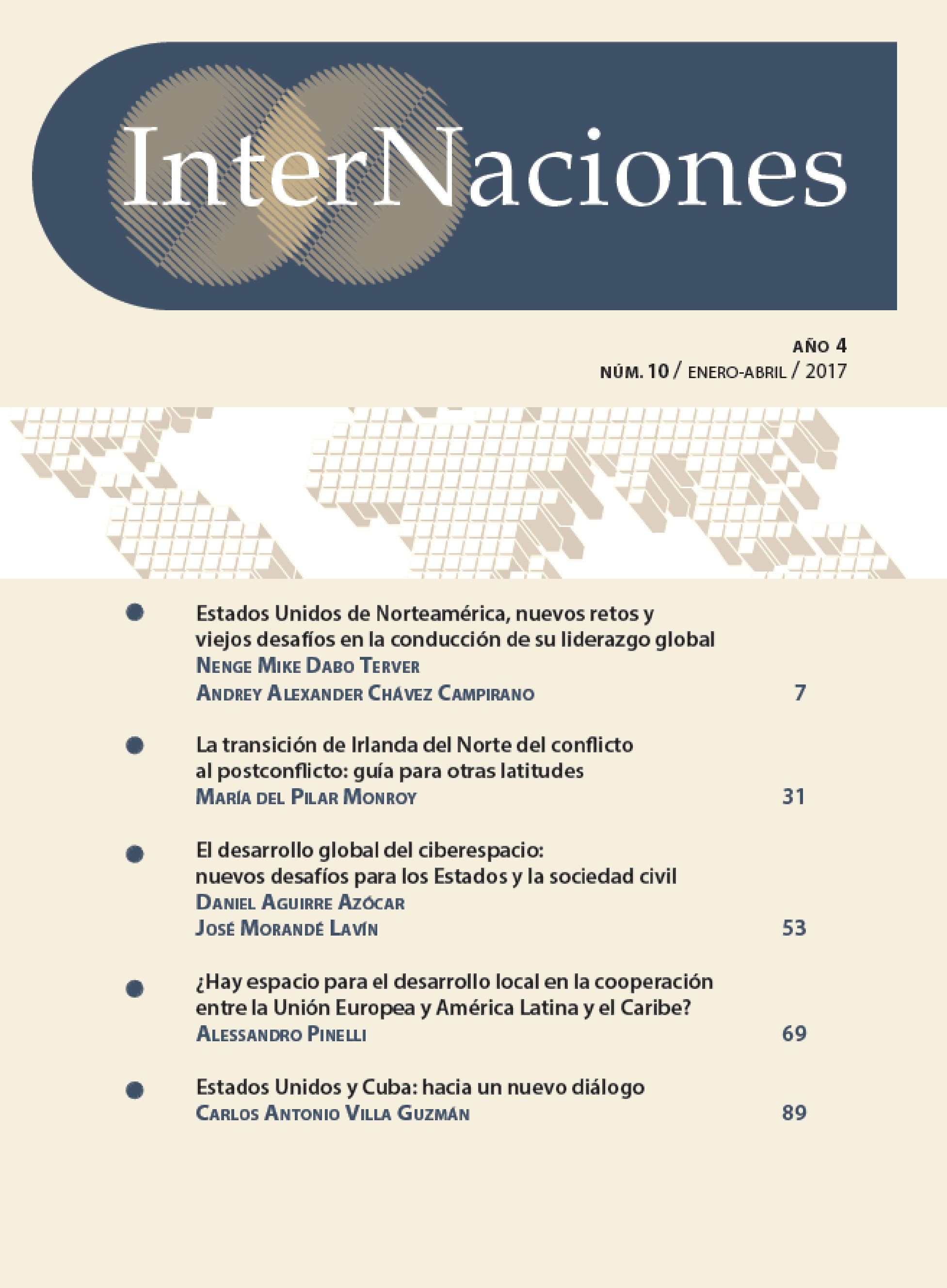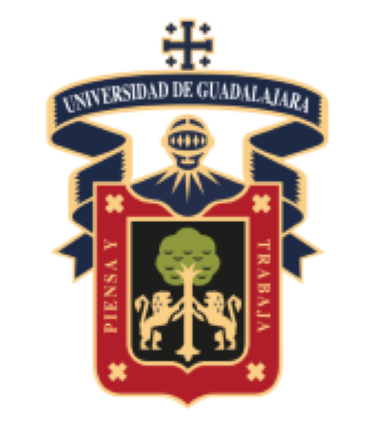United States of America, new and old challenges on the conduction of its Global Leadership
DOI:
https://doi.org/10.32870/in.v4i10.6888Keywords:
realism, security, emerging powers, leadership, geopoliticsAbstract
This work is an analysis of the foreign policy of the United States from the end of the Cold War to present, through which the true position of the country as a world power is determined, as well as the challenges it faces in maintaining its status as an economic, political and military superpower in the field of International Relations.Downloads
References
Arango, T. (2015, 17 de noviembre). Experts explain how global powers can smash ISIS. New York Times. Recuperado el 16 de diciembre de 2015 de http://www.nytimes.com/2015/11/18/world/middleeast/envi-sioning-how-global-powers-can-smash-isis.html?_r=0
Bosco, D. (2015, 29 de septiembre). The United States doesn’t want to Reform the U.N. Security Council. Foreign Policy. Recuperado el 20 de diciembre del 2015 de http://foreignpolicy.com/2015/09/29/the-united-states-doesnt-want-to-reform-the-u-n-security-council/
Brands, H. (2009). Latin America’s Cold War: An international history. EE.UU.: University of Texas.
Corona Aguilar, E. (2011). Cumbre del G-20. Dirección de servicios de investigación y análisis. Recuperado el 31 de marzo de 2015 en http://www.diputados.gob.mx/sedia/sia/spe/SPE-CI-A-05-11.pdf
Council of Councils. (2015). Report card on international cooperation 2014-2015. Recuperado el 16 de diciembre de 2015 de http://www.cfr.org/councilofcouncils/reportcard/#!/ranking/2015
Cox, M. (2012). Power shifts, economic change and the decline of the west? Kenneth N Waltz Lecture, International Relations, 26 (4), 369-388.
Cronin, A. K. (2015 marzo/abril). ISIS is not a terrorist group. Foreign Affairs. Recuperado el 30 de marzo de 2015 de
http://www.foreigna-ffairs.com/articles/143043/audrey-kurth-cronin/isis-is-not-a-terrorist-group
David, C. P. (2008). La guerra y la paz: enfoque contemporáneo sobra la seguridad contemporánea. España: ICA Editorial.
Figueiredo Machado, L. A. (2015, 30 de septiembre). A new chapter opens in Brazil-U.S. relations. The world post.
Recuperado el 17 de diciembre de 2015 de http://www.huffingtonpost.com/luiz-alberto-figueire-do-machado/a-newchapter-in-brazil-u_b_8223714.html
Corona Aguilar, E. (2011). Cumbre del G-20. Dirección de servicios de investigación y análisis. Recuperado el 31 de marzo de 2015 en http://www.diputados.gob.mx/sedia/sia/spe/SPE-CI-A-05-11.pdf
Gómez Camacho, J. J. & Alcalde Méndez, A. (2012). Hacia una diplomacia multilateral novedosa: una mirada desde Ginebra. Revista Mexicana de Política Exterior (95). Recuperado el 31 de marzo de 2015 de http://revistadigital.sre.gob.mx/images/stories/numeros/n95/introd.pdf
Heller, C. (2010). México y la estabilidad y la paz mundiales. En B. Torres & G. Vega (Coords.), Los grandes problemas de México, XII (2), 63-88. México: Colegio de México. Recuperado el 17 de diciembre de 2015 de http://2010.colmex.mx/16tomos/XII.pdf
Innes-Ker, D., Economy, E. C., Segal, A. & Schell, O. (2015, 22 de septiembre). How to improve U.S.-China Relations. Council on Foreign Relations. Recuperado el 24 de diciembre de 2015 de http://www.cfr.org/china/improve-us-china-relations/p37044
Kennedy, P. (1988). Auge y caída de las grandes potencias. México: Plaza y Janés.
Mahan, A. T. (2004). The Project Gutenberg eBook. The influence of sea power upon history, 1660-1783. Boston, MA, EE.UU.: Little, Brown & Company.
Mead, W. R. (2014). The return of geopolitics. The revenge of the revisionist powers. Foreign Affairs. Recuperado el 16 de noviembre de 2015 de
https://www.foreignaffairs.com/articles/china/2014-04-17/return-geopolitics
Nye, J. (2015, 14 de abril). The challenge of Russia’s Decline. Project Syndicate. Recuperado el 18 de diciembre de 2015 de http://www.project-syndicate.org/commentary/russia-decline-challenge-by-joseph-s--nye-2015-04
Pillay, V. (2014, 15 de septiembre). How the US and South Africa became friends again. Mail and Guardian Newspaper. Recuperado el 15 de diciembre de 2015 de http://mg.co.za/article/2014-09-15-how-the-us-and-south-africa-became-friends-again
Rudd, K. (2015). U.S.-China 21: The future of U.S.-China relations under Xi Jinping. Toward a new framework of constructive realism for a common purpose. Belfer Center for Science and International Affairs. MA, EE.UU.: Harvard Kennedy School.
Saudi Arabia forms Muslim «anti-terrorism» coalition. (2015, 15 de diciembre). Al Jazeera. Recuperado el 16 de diciembre de 2015 de http://www.aljazeera.com/news/2015/12/saudi-arabia-forms-muslim-anti-terrorism-coalition-151215035914865.html
Schirm, S. A. (2011, mayo). The G20, Emerging powers, and transatlantic relations. Transatlantic Academy Paper Series. Recuperado el 20 de diciembre de 2015 de http://www.transatlanticacademy.org/sites/default/files/publications/Schirm%20G20.pdf
Sedaca, N. & Bouchet, N. (2014). Holding steady? US democracy promotion in a changing world. EE.UU.: Chatham House.
The Aspen Institute. (s.f.). Past meetings of the U.S.-India strategic dialogue. Recuperado 18 de diciembre de 2015 de http://www.aspenins-titute.org/policy-work/aspen-strategy-group/USID/past-meetings
Torres, B. & Vega, G. (Coords.). (2010). Los grandes problemas de México, XII (2). México: Colegio de México. Recuperado el 17 de diciembre de 2015 de http://2010.colmex.mx/16tomos/XII.pdf
Vezirgiannidou, S. (2013, 15 de mayo). The United States and rising powers in a post-hegemonic global order. International Affairs, 89 (3), 635-651. DOI: 10.1111/1468-2346.12037
Vidal de la Rosa, G. (2010). ¿Ser o no ser? El realismo político y el multipolarismo del siglo XXI. Espiral, XVII(49), 231-252.
Walt, S.M. (2002). The enduring relevance of the realist theory. En I. Katnelzon & H. W. Milner (Eds.), Political science: the state of the discipline. Nueva York, EE.UU.: W.W. Norton & Company.
Waltz, K. (1979). Theory of International Politics. Nueva York, EE.UU.: Mc-Graw-Hill.
Wikileaks: US «routinely spied» on Brazil. (2015, 4 de julio). BBC News. Recuperado el 17 de diciembre de 2015 de http://www.bbc.com/news/world-latin-america-33398388
Downloads
Published
Versions
- 2021-02-19 (3)
- 2021-02-19 (2)
- 2017-05-31 (1)
How to Cite
Issue
Section
License
Copyright (c) 2017 University of Guadalajara

This work is licensed under a Creative Commons Attribution-NonCommercial-ShareAlike 4.0 International License.
CC BY-NC-SA 4.0 https://creativecommons.org/licenses/by-nc-sa/4.0/



























